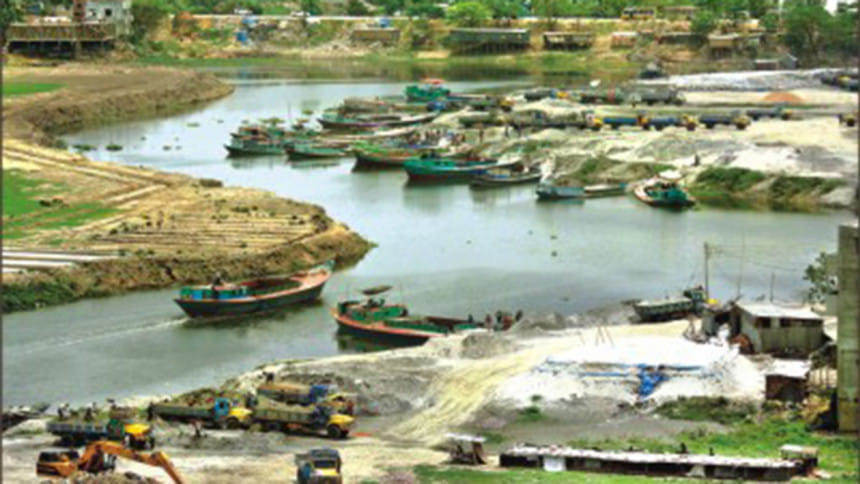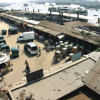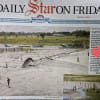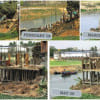Turag almost grabbed

Encroachment, after pollution, stands as the biggest threat to the life of our rivers. The reach and scope of the encroachers have made them seemingly invincible. Powerful, rich and ruthless, these encroachers have come to pull strings in government, pocket law enforcers and lean on land administration to produce ownership papers out of the blue. The legal system has been left helpless in its wake and left our rivers in peril. Starting today, we offer a series on the most visible encroachments on the Turag and three other Dhaka rivers, with a plea to authorities to go and check grabbers' claims. We invite our readers to join the cause -- save our rivers.
The Turag flowing along northern vicinity the capital is virtually disappearing from the map thanks to indiscriminate encroachment on the river for years. If the trend continues further, the river would become history for the future generations.
After a break of two years, the encroachers are back to business with the new Awami League government assuming power in January. It seems now there are no authorities to bar these people from encroaching the rivers around the capital.
Although the AL pledged before the national elections to bring "changes in political culture and prevailing ill practices", no change is apparent in the culture of river grabbing.
Different vested quarters including influential locals, political leaders, housing estates, government officials, refuelling stations, private universities, sand traders and religious groups have grabbed the banks of the Turag over the years.
Once an affluent 100-metre-wide river has now turned into a narrow canal to only 30-40 feet in width in some places as grabbing still continues in full swing.
Originating from the old Brahmaputra river, the Turag, main tributary of the Buriganga on the northern side of the capital, has a length of 78 kilometres and 23 kilometres of it flows along the city.
The river is now being sacrificed to 'development' as both the banks have been grabbed for constructing buildings. Besides, its waters are contaminated by lethal effluent, making it one among many rivers in the country to face environmental devastation.
With huge encroachment on both of its banks, the Turag in Tongi, Kamarpara, Ashulia and Amin Bazar points looks so pathetic that anyone might surely think the river would die any time, if not dead already.
Not only the banks, the riverbed itself in the upstream near Ashulia and Birulia has also been grabbed by the encroachers, who have erected huge structures at various points.
The Conservation of Playing Field, Open Space, Garden and Natural Water Body Act, 2000 enacted by the previous AL government clearly prohibits filling up of water bodies and terms it a punishable act.

Unfortunately, the authorities seem reluctant to enforce the law.
At least nine fresh patches on the bank of Turag are now being filled up between the Tongi Bridge and Ashulia just within a couple of kilometres.
Bringing soil by sand-carrying large cargo boats, the encroachers are filling up the river thanks to the 'circular waterway project' of Bangladesh Inland Water Transport Authority (BIWTA).
The BIWTA authorities have spent Tk 36 crore to implement the first phase of the project to maintain navigability of the river which is in fact facilitating encroachment.
During a recent visit to the river, many 'ownership' notices were seen that read "owned by purchase". The notices were erected in places where the waters reach during high tide, very much within the river periphery.
In several notices the so-called owners have mentioned references of their land documents even from the surveys during the British and Pakistan rules, though all encroachments have occurred since independence in connivance with the land office.
The grabbers briefly went on back foot when the military-backed caretaker government came to power and cracked down on them. But they resumed grabbing since the end of 2008.
None of the government agencies including the BIWTA, Water Development Board and law-enforcement agencies now seems to be able to take any meaningful action against the encroachers.
Talking to The Daily Star, BIWTA Secretary Syed Monowar Hossain said: "Encroachment and eviction both are a continuous process. We have not stopped our eviction drives. Soon we'll evict them all".
"The good news is any concrete structures have not yet been erected in most of the places. We can remove all the soil from there if it fills any parts of the river," he added.
The BIWTA is the regulatory body to maintain the 110-kilometre river routes around the capital involving the Buriganga, Shitalaksha, Balu, Turag and Dhaleshwari rivers. The end of encroachment of these rivers largely depends on this body.
Edited by: Al Mamun Russell

 For all latest news, follow The Daily Star's Google News channel.
For all latest news, follow The Daily Star's Google News channel. 








Comments